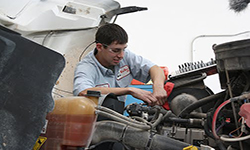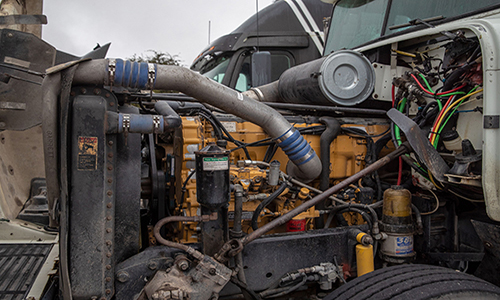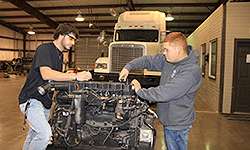Diesel Technology
Diesel engines have been in commercial use for over a century and in fact, are the dominant source of power for commercial trucks, trains, ships, and stationary power sources. Because of this, diesel mechanics have long been a vital part of the economy and their importance continues to grow as the popularity of diesel engines increases.
From the small diesel engines used for portable generators to gigantic diesel power plants driving ocean-going freighters, diesel engines are a central part of the world’s transport and industrial infrastructure.
For this reason, a career as a diesel mechanic is an extremely attractive option for individuals seeking a well-compensated and dependable source of employment.
 |
 |
 |
Program Details
Select Links Below for Details
At Midland College, earning an Associate of Applied Science for Diesel Technology prepares you for entry-level employment as a certified diesel mechanic who can diagnose, repair, and maintain diesel engines. From semi-trucks to shipping fleets, diesel mechanics need to have the necessary skill set to effectively perform their duties.
This program is accredited by the National Automotive Technicians Education Foundation (NATEF). The curriculum is designed to prepare students for successful completion of the Automotive Service Excellence (ASE) national certification.
Specific areas of training include electrical systems, electronic controls, brake systems, suspension and steering, heating and air conditioning, engine performance, engine repair, manual drive trains and axles, hydrostatic and automatic transmissions and diesel/automotive shop management.
Marketable Skills
Pursuing a degree in this field of study will provide marketable skills in these areas:
- Technical training – students will receive a core understanding of electrical systems, software programs, enterprise management, and word-processing
- Communication
- Operations analysis – Figuring out what a product or service needs to be able to do
- Reading Comprehension – reading work-related materials
- Critical thinking – Thinking about the pros and cons of different ways to solve a problem
- Active Listening – Listening without interruption and asking good questions
- Speaking – Talking to others
- Service Orientation – Assisting people
- Judgment and Decision Making – Thinking about the pros and cons of different options and picking the best one
- Leadership
- Teamwork
Career Opportunities
Depending on the levels of education and experience achieved, possible career paths include:
- Shop Manager
- Diesel Parts Handler
- Machine Shop Professional
- Claims Adjuster
- Diesel Billing/Title Clerk
- Field Service Technician
- Rig Mechanic
- Truck Mechanic
- Locomotive Technician
- Ship Mechanic
- Marine Equipment
- Aviation Technician
- Natural Gas Compression Technician
- Fleet Manager
Demand
The Bureau of Labor Statistics (BLS) projects from 2014-2024, employment opportunities for diesel service technicians will increase by 12 %. This may be due to several factors, including the growing number of cars and trucks in operation, the improved longevity of vehicles and the increasing use of diesel engines in automobiles.
Did you know?
- Texas employs the most engine & other machine assemblers in the nation.
- Annual median wage in Texas: $37,000
- Hourly median wage in Texas: $17.71
- Engine assembler jobs increase by 2022: 19%
SOURCE: U.S. Bureau of Labor Statistics and O*NET OnLine
(wages will vary by location, employer, and experience)
To be considered for a scholarship, please follow the link below:
Visit the course catalog for the most complete and up-to-date information.
Why study Diesel Technology at MC?
Workforce Solutions (WIOA) Eligible
Students choosing this academic pathway may receive funding and other financial assistance and support from Workforce Solutions. See www.facebook.com/PermianBasinWorkforce, call (432) 367-1449 (option 5), or open the flyer for information on the services they provide in partnership with Midland College. The Workforce Solutions office is located on Midland College's main campus, in room 138 of the Technology Center (TC) Building. Note: Students receiving federal and state financial aid are not eligible for WIOA assistance.
ContactDepartment ChairErick Gutierrez Faculty |
Division OfficeApplied TechnologyMarie Hall Academic Building |
Related Programs |
Related Resources |
Apply to MC Now
Thank you for choosing Midland College! If you are here to collect a few credits, take courses to transfer, or here to start a new career, we welcome you.